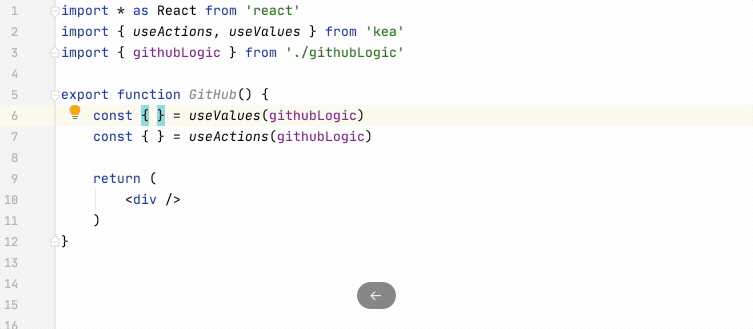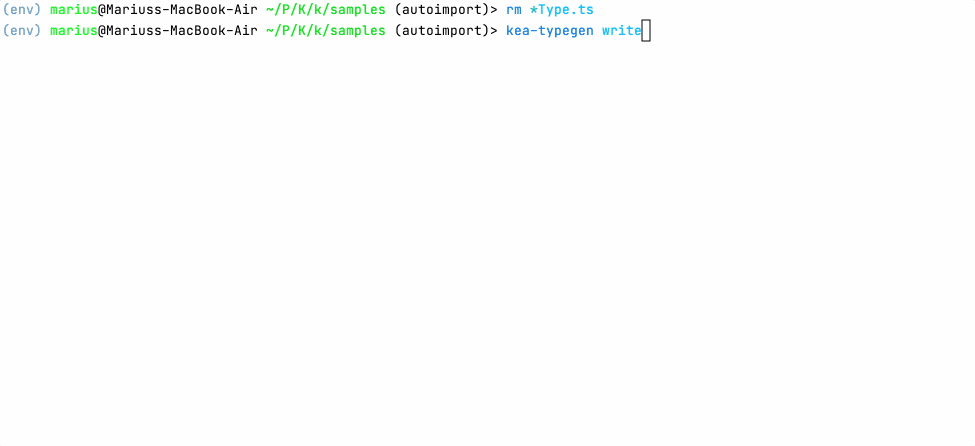TypeScript
Create and pass a logicType
To add TypeScript support to your logic, create a logicType, and pass it as the kea function's type argument:
import { kea, actions, reducers } from 'kea'
import { loginLogicType } from './loginLogicType'
const loginLogic = kea<loginLogicType>([
actions({
setUsername: (username: string) => ({ username }),
}),
reducers({
username: ['keajs', { setUsername: (_, { username }) => username }],
// ...
}),
])
This provides automatic typing wherever you use the logic:

Option 1: MakeLogicType<V, A, P>
There are two ways you can get a logicType. The first is manually:
interface Values {
id: number
created_at: string
name: string
pinned: boolean
}
interface Actions {
setName: (name: string) => { name: string }
}
interface Props {
id: number
}
type myLogicType = MakeLogicType<Values, Actions, Props>
const myLogic = kea<myLogicType>([
actions({
setName: (name) => ({ name }),
}),
reducers({
name: ['', { setName: (_, { name }) => name }],
// etc
}),
])
Option 2: kea-typegen
The second way is with kea-typegen, which uses the TypeScript Compiler API to analyse your .ts files and generate type definitions for your logic.
Run kea-typegen write or kea-typegen watch and get a bunch of logicType.ts files:

The generated types will be automatically added to the kea() call.
import { kea } from 'kea'
import { githubLogicType } from './githubLogicType'
export const githubLogic = kea<githubLogicType>([
// ^^^^^^^^^^^^^^^^^ 👈 added automatically
actions({ skip }),
reducers({ skip }),
listeners(({ actions }) => ({ skip })),
])
It's a bit of extra work, but works like magic once set up!
Installation
First install the kea-typegen and typescript packages:
# if you're using yarn
yarn add --dev kea-typegen typescript
# if you're using npm
npm install kea-typegen typescript --save-dev
Running typegen
- While developing, run
kea-typegen watch, and it'll generate new types every time your logic changes. - Run
kea-typegen writeto generate all the types, for example before a production build. - Finally,
kea-typegen checkcan be used to see if any types need to be written
Here's a sample pacakge.json, that uses concurrently
to run kea-typegen watch together with webpack while developing:
# if you're using yarn
yarn add --dev concurrently
# if you're using npm
npm install concurrently --save-dev
{
"scripts": {
"start": "concurrently \"yarn start:app\" \"yarn start:kea\" -n APP,KEA -c blue,green",
"start:app": "webpack-dev-server",
"start:kea": "kea-typegen watch --write-paths"
}
}
When should you specify types?
With TypeGen, you should only need to specify each type once. This means at the boundaries: the action parameters and
any defaults, including in reducers or loaders. Everything else, including various return types, should be detected
automatically.
import { Blog } from './blog'
import { logicType } from './logicType'
export const LocalType = 'YES' | 'NO'
// The kea<...> part is automatically added and kept up to date by kea-typegen
const logic = kea<logicType<LocalType>>([
actions({
openBlog: (id: number, blog?: Blog) => ({ id, blog }), // 👈 add types here
closeBlog: (answer: LocalType) => ({ answer }),
}),
reducers({
blogId: [
null as number | null, // 👈 null now, but sometimes a number 🙀
{ openBlog: (_, { id }) => id, closeBlog: () => null },
],
}),
listeners({
closeBlog: ({ answer }) => {
console.log(answer)
},
}),
])
Files generated with kea-typegen will automatically import any types they can, and add the rest as type arguments
for kea<logicType<LocalType, LocalUser>>
Create logic-builder-type-builders
If you're building custom logic builders, and want typegen to automatically generate types, you must write a logic-builder-type-builder. 😅
This involves creating a typegen.ts or a setters.typegen.ts file next to your setters.ts builder. This file should
export a function with the same name as the builder, and similar to the builder, add various actions, reducers
and other features on the type of the logic.
Check out the sample typedForm.typegen.ts,
or the more full-featured typegen.ts from kea-forms,
for examples of such type builders.
note
These type builders area a new area of development for kea, starting with 3.0, and we're working on making this API simpler for all.
For now, you'll need to know how the TypeScript Compiler API works, and write code to manipulate TypeScript Nodes and TypeNodes.
ProTip: Get a useful debugger, and use the TypeScript AST Viewer.
Caveats / Known issues
- Using namespaced types like
ExportedApi.RandomThingis slightly broken. You may sometimes need to create aninterfacethatextendsthe original type, and use that in your actions/reducers. Creating atypealias will not work, as "One difference is that interfaces create a new name that is used everywhere. Type aliases don’t create a new name — for instance, error messages won’t use the alias name". For example:
interface RandomThing extends ExportedApi.RandomThing {}
Alternatively, disable such errors in your
logicType.tsxfiles, by passing--add-ts-nocheckto kea-typegen.With some tools you might need to "Reload All Files" or explicitly open
logicType.tsto see the changes.Adding types with
logic.extend()isn't implemented yet.
Found a bug? Some type wrongly detected? Post an issue in the kea-typegen repository.
Questions & Answers
Ask questions about this page here.